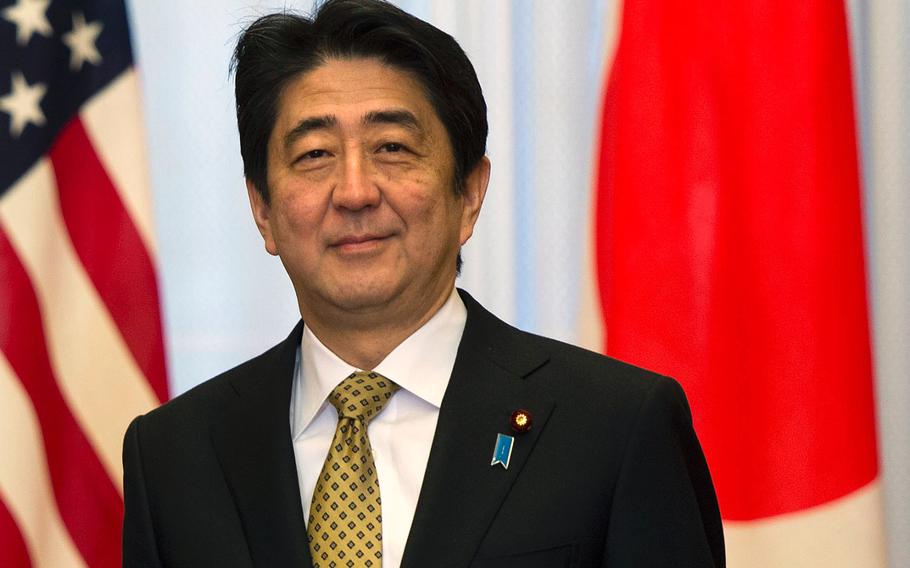Asia-Pacific
Abe making public case for Japan to defend allies in combat
Stars and Stripes May 15, 2014

Japanese Prime Minister Shinzo Abe attends a meeting at his official residence Sori Daijin Kantei in Tokyo, Japan, on April 5, 2014. (Erin A. Kirk-Cuomo/U.S. Department of Defense)
TOKYO — Japan must reinterpret its pacifist constitution in order to safeguard its citizens and preserve regional peace, Prime Minister Shinzo Abe told the nation during a televised press conference Thursday night.
Abe said he wants to end the ban on engaging in collective self-defense, following recommendations made in a government committee report released earlier in the day.
Reinterpreting the constitution would allow, for example, a Japanese ship to defend a U.S. Navy ship under attack in international waters, something government officials say is illegal under the current interpretation.
Even if the U.S. ship were carrying evacuated Japanese citizens, the Japan Self-Defense Forces could take no action under the current legal interpretation, Abe said.
“I and the government have the responsibility to protect the lives of [Japanese people],” Abe said. “Is it OK for us to not be able to do anything?”
Ending the ban would also allow Japan to legally shoot down a missile fired over the country and toward the United States by North Korea, as well as allow Japan to rescue its aid workers abroad, according to the report recommendation.
According to Abe, the reinterpretation can be achieved through Cabinet approval, rather than an actual amendment to the constitution, which would require two-third support of parliament and a public referendum.
Those opposed to the move cite Abe’s attempt to subvert the Japanese law, as well as the lack of a clear threat requiring the change. Opponents also view the measure as opening the door to a full-fledged military in the future.
“There are misconceptions that Japan will become a country that will fight wars, but there is no way,” Abe said. “The course of our country, which has been taken as a pacifist nation, will not change in the future.”
So far, Abe has faced resistance, though quantifying the opposition has proven difficult.
The Asahi Shimbun, a Japanese newspaper that opposes Abe’s measure in its editorial pages, found that only 29 percent answered yes when asked “whether Japan should lift the ban on collective self-defense.”
The rival Yomiuri Shimbun, which is viewed as more conservative, found nearly the opposite with slightly different wording: Sixty-three percent said they supported defending an ally, assuming it was “authorized with the minimum force necessary.” Another 8 percent favored the measure unconditionally.
Abe also must convince skeptical leaders of New Komeito, the minority partner in his government, that the proposed changes won’t lead Japan on an unnecessary path to war.
Opponents to Abe’s plans aren’t necessarily hostile to the U.S.-Japan security alliance.
Kyoji Yanagisawa, chief director of International Geopolitics Institute, a private think tank, said he doesn’t oppose U.S-Japan cooperation, but believes that intelligence-sharing and logistics requests are sufficient.
Yanagisawa added that ending the collective self-defense ban could put Japan in a position where it must choose between its own interests and rejecting a U.S. request for aid.
Such a request “could shatter the U.S. alliance,” Yanagisawa said.
Officials favoring collective self-defense say that is unlikely. Japan and the U.S. have disagreed in recent decades without disastrous consequences, though not on matters of direct combat.
Meanwhile, Abe’s supporters contend that North Korea’s continued development of nuclear weapons, coupled with China’s increasingly assertive use of force in Asia-Pacific waters, show an alignment of interests.
“A challenge against the status quo by force is something we have to avoid,” Shinichi Kitaoka, deputy chairman of the Advisory Panel on Reconstruction of the Legal Basis for Security, told Stars and Stripes in April. “We cannot be indifferent in the situation in the South China Sea. Therefore, we must strengthen our cooperation.”
If the ban on collective self-defense does end, its exercise will come with conditions.
The panel’s recommendations include that a request for aid come from a close ally under attack, and that the attack would represent a grave threat to Japan’s security.
The prime minister and national security council would then request the use of force and gain Diet approval.
Japan would “use force to the minimum extent necessary,” according to the report.
In emergency situations, the panel recommended giving the council power to take action and gain Diet approval afterward, a measure with could draw some opposition.
Japan would also be required to gain approval from any other nation where forces must transit on the way to a conflict, according to the recommendations.
Abe will try to gain approval by the end of the Diet session June 22, though some officials have stated that it may take longer. If approved in June, it would likely take until at least the end of this year to amend the self-defense law and others, which are legal precursors to collective self-defense.
Japan's constitution has never been amended in its 67 years of existence.
slavin.erik@stripes.com Twitter: @eslavin_stripes